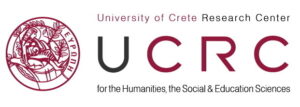Chair. Minas Samatas

Μinas Samatas is Professor Emeritus of Sociology, after serving 32 continuous years at the Sociology Department of University of Crete. He holds a PhD in Sociology from the Faculty of Social Science of New School, NY, and also a Jean Monnet Fellowship (1998-2004). He participated actively in two research programs and academic networks. His publications, especially on surveillance in Greece, from anticommunist to the current electronic one, are internationally acclaimed. See: https://scholar.google.com/scholar?hl=en&as_sdt=0%2C5&q=Minas+Samatas&btnG and https://www.researchgate.net/profile/Minas-Samatas-2
Olympios Dafermos, "The Antidictatorial Student Movement: Physiognomy and effective action"
The anti-dictatorial Student Movement emerged in January 1972, after the dismantling of most of the illegal resistance organizations. Its activities, organization and operation are not similar to those of the resistance organizations. It structures its self-organization from the bottom-up. It operates in a direct democratic manner, visibly and en mass. It is not determined by political centres outside of the student community. It detects its modes of action by surprising the repressive mechanisms, and, at the same time, surprising itself. Within it, and after its inception, left-wing student resistance organizations are created, and are determined more by the movement, which they themselves create, rather than by their political party guidance. The function of its self-organization, whose units function in a coordinating way and not authoritatively, ensures the unity of the movement, its wide expansion and, by extension, its effective action.
 Mechanical-Electrical Engineer, NTUA. PhD, Panteion University. Member of the Coordinating Committee of the Polytechnic uprising. He was persecuted by the junta for his resistance activities. He is author of books on the Anti-Dictatorial Student Movement: Students and the Dictatorship 1972-73 (in greek), From Hope to Despair 1973-2013 (in greek), It was all a dream… (with Vangelis Angelis) (in greek), French May and the Anti-Dictatorial Student Movement (in greek).
Mechanical-Electrical Engineer, NTUA. PhD, Panteion University. Member of the Coordinating Committee of the Polytechnic uprising. He was persecuted by the junta for his resistance activities. He is author of books on the Anti-Dictatorial Student Movement: Students and the Dictatorship 1972-73 (in greek), From Hope to Despair 1973-2013 (in greek), It was all a dream… (with Vangelis Angelis) (in greek), French May and the Anti-Dictatorial Student Movement (in greek).
Anna Madoglou, "The anti-dictatorial activism in Greece The minority of the Polytechneion: Emergence - Conflict - Integration"
On 21 April 1967, the junta imposed itself by force, without obtaining the consent of the Greek people. The Polytechnic uprising of November 1973 was a milestone in the anti-dictatorship struggle, led mainly by young students. The research tests the hypothesis whether the Polytechnic uprising is an act of minority, and whether the participants in the revolt acted as an active minority. Three historical moments are presented: the emergence, the conflict and the integration. The process of emergence of the Polytechnic minority is traced to the post-war expansion of educational mechanisms and the formation of the students as a historical subject (identity). In the conflict phase, the three social opponents are defined: the participants in the revolt/a minority – the military regime/power – the Greek people/population, the stakes of the conflict, the relations established between them and the behaviors that were adopted. Finally, integration is linked to the idea that, when the goals of the minority are fulfilled, the latter transforms into a dominant social group.
 Anna Madoglou is a Professor of Social Psychology in the Department of Psychology at Panteion University of Social and Political Sciences. Her research interests focus on the construction of social memory, social oblivion (social representations, social remembrance, social oblivion, nostalgia, cognitive polyphasia, social change), minority groups/identities and their action.
Anna Madoglou is a Professor of Social Psychology in the Department of Psychology at Panteion University of Social and Political Sciences. Her research interests focus on the construction of social memory, social oblivion (social representations, social remembrance, social oblivion, nostalgia, cognitive polyphasia, social change), minority groups/identities and their action.
Panayotis G. Kimourtzis, “Student movement, student unrest, student resistance: the Greek 20th century. A discussion with starting point the 21st April 1967 dictatorship”
Students leading role and dynamic involvement, were key factors in putting an end to the April 21st, 1967 dictatorship in Greece. Being a major turn point in modern Greek history, this immediately gave rise to discussions on the role of the so called “student movement” and its relation to political developments through the course of coming years. Under the circumstances, contemporary studies began to unify earlier student activities on the whole. Temporarily, according to the dominant viewpoint, students were attributed a continuous progressive attitude (ideologically and practically).
Today, richer archival records, as well as further elaborated understanding, allows researchers to reconsider this position. Furthermore, international discussions about the interventionist -political and social- character of student action, have emerged.
As from the 1980s and onwards, this shift was supported by the development of the history of universities research field. Greek student activities are considered comparatively, while integrated into the international context. Actually, this is linked to considerations within homocentric circles: protests against university issues, actions for political decisions in democratic regimes, resistance to authoritarian regimes.
This presentation aims to disengage Greek students’ resistance against the April 21st, 1967 dictatorship from other student actions of the past. It also aims at promoting it as a leading action of conscious political intervention, with well-defined orientation, as well as a broad impact. Nonetheless, it associates with similar actions within fascist regimes in other countries (indicatively: Spain, Portugal). Finally, it aspires to disengage from a sterile form of co-examination with other actions which showed a dissimilar structure, as well as scope.
 He teaches modern and contemporary Greek History, Comparative History of Education and Education Policies. He has been invited as Maître de conferences at École des Hautes Études en Sciences Sociales-Paris and as Honorary Senior Research Associate at the Institute of Education – University College London (UCL). He is now President of the Greek Society of Education Historians. He also leads the Historical Archive of the University of the Aegean and the Cine-Science Seminar. He has been honored by the French Ministry of Education with the distinction “Chevalier dans l’ Ordre des Palmes Académiques”.
He teaches modern and contemporary Greek History, Comparative History of Education and Education Policies. He has been invited as Maître de conferences at École des Hautes Études en Sciences Sociales-Paris and as Honorary Senior Research Associate at the Institute of Education – University College London (UCL). He is now President of the Greek Society of Education Historians. He also leads the Historical Archive of the University of the Aegean and the Cine-Science Seminar. He has been honored by the French Ministry of Education with the distinction “Chevalier dans l’ Ordre des Palmes Académiques”.


